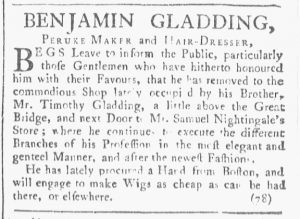What was advertised in a colonial American newspaper 250 years ago today?

“Will engage to make Wigs as can be had there.”
When Benjamin Gladding, a “PERUKE MAKER and HAIR-DRESSER,” advertised in the May 6, 1769, edition of the Providence Gazette, he made multiple appeals to prospective clients. He emphasized both his knowledge of the latest styles and the amenities available at his shop, but he also made a more common appeal to price.
Gladding addressed the public, but he made certain to acknowledge “those Gentlemen who have hitherto honoured him with their Favours.” Doing so made it clear to other prospective customers that Gladding already had an established clientele who placed their confidence in his attention to their hair and wigs. Gladding offered a service that should not be entrusted to some mere novice. To that end, he proclaimed that he “continues to execute the different Branches of his Profession in the most elegant and genteel Manner, and after the newest Fashion.” Experience, skill, and knowledge all played a role as Gladding positioned himself as the wigmaker and hairdresser of choice in Providence. He gained experience and developed skills over time, but maintain knowledge of “the newest Fashion” required constant and immediate attention. Gladding could not rely on what he had learned in years past because his clients certainly would not be satisfied with outdated styles.
Serving them “in the most elegant and genteel Manner” also depended on the setting. In this case, Gladding stressed that he had moved “to the commodious Shop” until recently occupied by his brother. He provided comfortable and spacious accommodation for his patrons. Having sufficient space was even more important because Gladding had a new employee. He reported that he had “procured a Hand from Boston” who assisted in serving his clients. Together, they made wigs “as cheap as can be had” in Boston or elsewhere. Striking a fashionable appearance did not need to be prohibitively expensive, not even in places beyond the largest port cities. Gladding may not have had as much local competition as his counterparts in Boston, but that did not mean that he raised the rates.
To attract existing and new clients to his shop, Gladding resorted to a variety of appeals in his short advertisement. In addition to highlighting his own skill and experience as a wigmaker and hairdresser, he balanced fashion and price as a means of making his services simultaneously exclusive and attainable.

